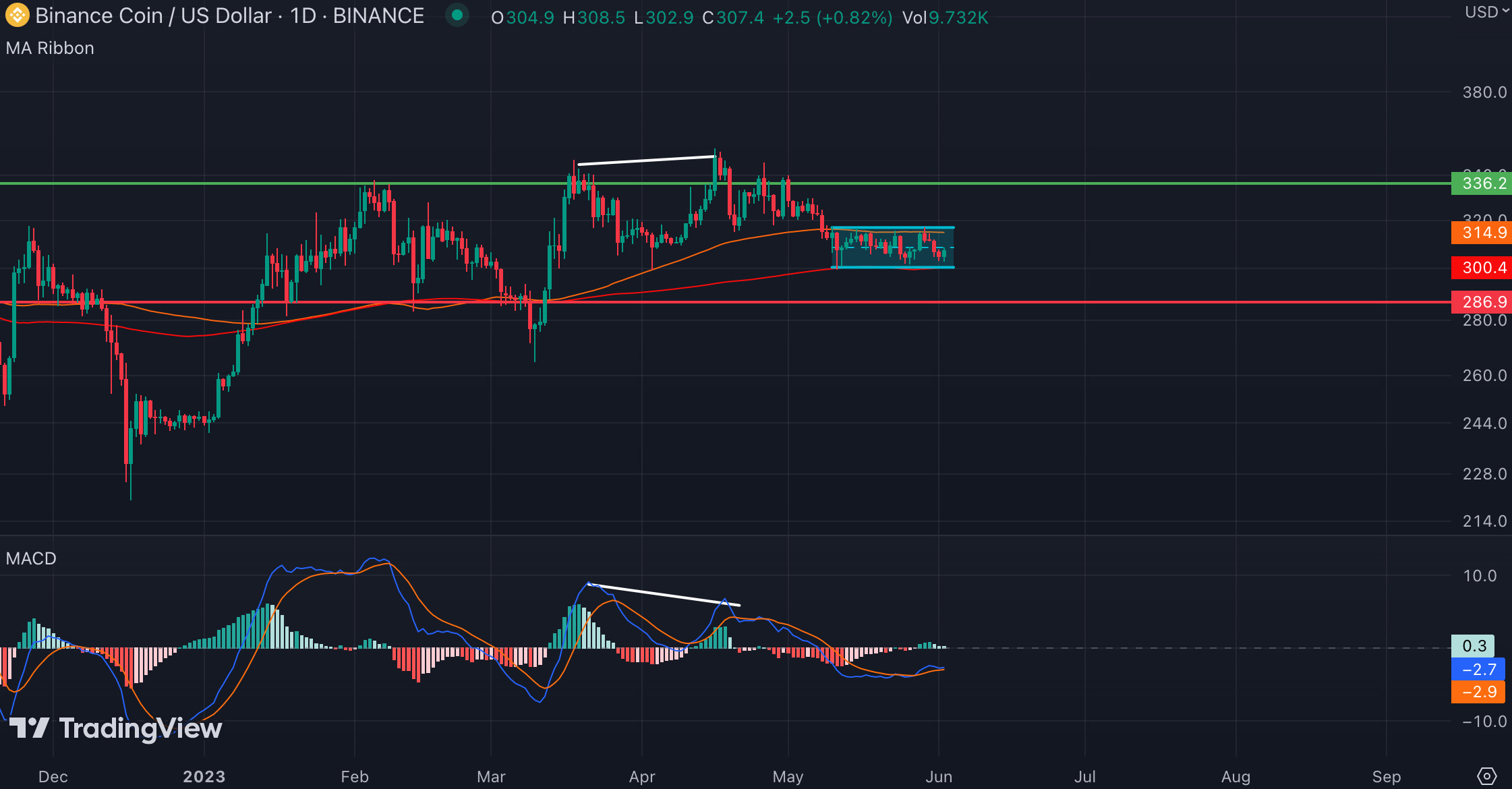In this week’s crypto highlights, we explore the price movements of BTC, XRP, BNB, and AVAX. Additionally, this recap includes other notable industry news items that occurred over the last seven days. Without further ado, let’s dive into the latest market developments.
Noteworthy market events
Multichain halted some of its services due to network issues, and the “disappearance” of its CEO
Starting on May 21, users of the cross-chain protocol Multichain (MULTI) began to complain about transactions getting stuck. The project team stated that the difficulties appeared during node maintenance and a network update. On May 24, the team reported in its Telegram channel that they are “working on the last router,” and that everything should be back to normal soon. The same day, the project tweeted about compensation to affected users.
However, Lookonchain analysts discovered that several large investors started moving their holdings to sell MULTI tokens. In addition, the Fantom Foundation removed 450,000 MULTI tokens (~$2.4 million) from its portfolio on the decentralized exchange SushiSwap.
The catalyst could be rumors that Chinese police have arrested Multichain’s CEO, Zhaojun, and other team members, seizing $1.5 billion in smart contract funds. Amid these rumors, Multichain suspended services for over 10 chains. On May 31, the Multichain team revealed that it was unable to contact its CEO, fueling concerns that the protocol’s leadership may in fact have been arrested.
Gate.io denied insolvency issues
And here is the sequel to the Multichain story. It arrives faster than you anticipated, right? On May 24, Arkham Intelligence, a blockchain analytics firm, shared data indicating significant inflows of MULTI tokens into Gate.io. The firm suggested that these inflows were linked to rumors circulating about the alleged arrest of the protocol’s leadership in Shanghai. Additionally, on May 31, several Twitter users began posting images of transactions purportedly showing large deposits of FTM made by Multichain team members into Gate.io.
As a result of observing numerous deposits of MULTI and FTM tokens into Gate.io, certain Twitter users began speculating that the exchange might be exposed to fallout from Multichain. In response to these concerns, the Gate.io team published a statement on May 31, refuting these rumors, and affirming that the exchange is processing all withdrawals and operating normally.
However, on the same day, the platform experienced $150 million worth of withdrawals, or around 10% of its reserves, according to DeFiLlama.
Hong Kong lifted the crypto trading ban for retail investors
On May 23, The Hong Kong Securities and Futures Commission (SFC) announced it would allow licensed platforms to serve retail investors beginning June 1, 2023. The regulator stated that virtual asset service providers (VASPs) willing to comply with its guidelines are welcome to apply for a license. The guidelines include asset custody safety requirements, cybersecurity standards, and the segregation of client funds.
According to the announcement, the SFC received 152 written submissions from crypto platforms during the consultation period. Some exchanges have already begun providing services for retail investors in Hong Kong.
For instance, Huobi tweeted that it submitted its VASP application in Hong Kong, and will start offering crypto trading. Gate.io, Bitmex, CoinEx, and OKX also signaled their intention to obtain Hong Kong’s VASP license.
Digital Currency Group sunsets its prime brokerage unit, TradeBlock
Digital Currency Group (DCG), the parent company of the trading platform TradeBlock, has initiated the process of winding down TradeBlock’s operations. The shutdown of the trading platform, primarily focused on institutional investors, was effective as of May 31. The decision to sunset the platform was prompted by the overall state of the economy, and the uncertain regulatory landscape surrounding digital assets in the U.S., as stated by DCG.
This development follows a series of challenges faced by the crypto conglomerate, including the bankruptcy filing of its subsidiary, Genesis Global, earlier this year. In May, DCG missed a $630 million debt payment owed to Genesis, while its CFO resigned in April.
One sentence news
- A group of six crypto investors, with the support of Coinbase, have filed a lawsuit against the U.S. Department of Treasury for imposing sanctions on Tornado Cash.
- Tourists visiting Bali have been warned against using cryptocurrencies as a form of payment.
- China released a Web3 whitepaper, and it raised interest in the country’s stance toward the crypto industry.
- DeFi observers found that metadata for SuiSwap, which is considered one of the flagship Sui projects, was a “copy-paste” of AptosSwap.
Bitcoin could be inside a falling wedge
Bitcoin continues to follow its traditions. Last month, we mentioned that “May has been the worst-performing month for BTC over the last two years.” Interestingly, Bitcoin’s performance in May aligned with this observation, as it recorded its first monthly loss in the past six months.
However, this does not necessarily mean that the worst is over. Although U.S. officials essentially agreed on resolving the country’s debt ceiling crisis (and the deal has been passed in Congress and Senate), the moves didn’t significantly help Bitcoin.
On May 28, U.S. officials released a draft bill, outlining a two-year suspension of the debt ceiling, and dropped a proposed 30% crypto mining tax. Following this positive development, Bitcoin temporarily tested the $28,000 level, but the initial euphoria waned. The markets began to comprehend that the Fed might still proceed with its rate hikes, particularly after the release of U.S. Personal Consumption Expenditures data (PCE).
In a few days, the likelihood of a 25-basis point hike at the Fed’s June 13-14 meeting surged to 71%, from an initial 17%. But then, markets turned out the table, and, at the moment of this writing, CME is showing completely opposite numbers (76% probability of holding rates). This could provide a moment of relief for wider financial markets, which may also positively influence Bitcoin’s performance in the short term.

A daily timeframe indicates that Bitcoin could be trading inside a falling wedge pattern (white lines). Since the uptrend preceded its formation, it could act as a continuation pattern. Volume has been gradually decreasing within a converging channel, which also hints at price recovery. A potential price target in the case of a pattern confirmation could be within the $31,000-32,000 range, which corresponds to a weekly mean level highlighted in our previous analysis.
Another catalyst, which may support a bullish momentum, could be the daily MACD. The indicator experienced a bullish crossover (green circle), and approached a zero line. Earlier this year, such events preceded price rallies up to 40%.
However, if the asset breaks the descending support line, this could potentially invalidate the bullish view, and open the gate to the 0.5 Fibonacci point, or even 200-day SMA.
XRP experienced a drastic surge in network activity

On May 21, crypto lawyer and Ripple supporter John Deaton pointed out internal emails from the U.S. Securities and Exchange Commission (SEC), which suggest that the regulator knew XRP did not fully meet the definition of a security.
In addition, Ripple has achieved a victory against the SEC by effectively opposing the agency’s attempt to seal the “Hinman speech documents.” The papers are due for release on June 13, and some believe it could be a turning point in Ripple’s legal battle with the SEC.
This increased optimism surrounding Ripple, and its native token. During the period between May 26 and May 29, the XRP Ledger network witnessed an exceptional surge in user activity, marking its second-highest volume ever recorded. According to Santiment, the number of XRP daily active addresses skyrocketed from 18,090, to 490,350.
As a result, the XRP price experienced an over 10% weekly increase, approaching the $0.53 resistance area. But the asset reached the overbought zone on a daily chart, and may experience temporary consolidation, potentially testing the 20-day EMA.
BNB is preparing for a major network update

BNB Chain developers announced a Luban hardfork will take place at block height 29,020,050, or around June 11, 21:30 UTC. The upgrade includes three suggestions: BEP-126, BEP-174, and BEP-221.
BEP-126 implements the first part of the FastFinality mechanism, dedicated to improving the block finalization process. The next BEP will introduce a relay management mechanism to increase the security of the cross-chain BSC Bridge. Lastly, BEP-221 brings forth the “CometBFT Light Block Validation,” a system that proposes adding a new contract used for the secure replication of decentralized applications (dApps).
Despite this, the BNB price continued to move inside a rectangle (cyan channel), consolidating between 100-day and 200-day SMAs. The pattern has been forming for almost a month, and is considered to be neutral.
Rectangles typically signal that the next move after the breakout could be as big as the pattern’s height. As a result, $336 and $286 could be viewed as potential price targets. Daily MACD experienced a bullish crossover, and higher lows on lower timeframes. This indicates that bulls may have more chances to break the channel.
AVAX formed a bullish divergence

Ava Labs, the company behind layer 1 blockchain Avalanche, unveiled AvaCloud, a Web3 launchpad designed to assist businesses in constructing fully managed blockchain ecosystems, without the need for coding. AvaCloud comprises four key elements: an automated blockchain builder, managed validators, comprehensive data tools, and chain interoperability.
Additionally, Ava Labs recently rolled out Avalanche Warp Messaging, which allows native communications between all Avalanche subnets. These newly introduced tools enable users to swiftly create free testnets, transition to the mainnet, and progressively incorporate additional functionalities as they expand their operations over time.
Nevertheless, the AVAX price continued to move inside a downtrend, and reached a major support level of $14. But the asset formed a bullish divergence on lower timeframes with both RSI and MACD. The divergence occurring right at the crucial support further increases its significance. The 20-day EMA is currently acting as a dynamic resistance level for the price. In case of a breakout upward, this could push the asset to the 200-day SMA.
Tune in next week, and every week, for the latest CEX.IO crypto highlights. For more information, head over to the Exchange to check current prices, or stop by CEX.IO University to continue expanding your crypto knowledge.
Note: Exchange Plus is currently not available in the U.S. Check the list of supported jurisdictions here.
Disclaimer: For information purposes only. Not investment or financial advice. Seek professional advice. Digital assets involve risk. Do your own research.Will Bitcoin experience another short-term rally?
